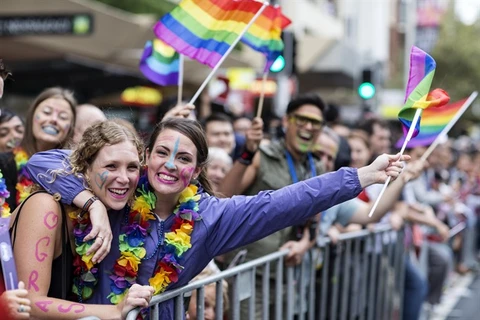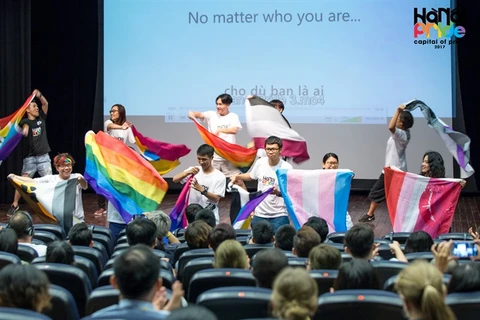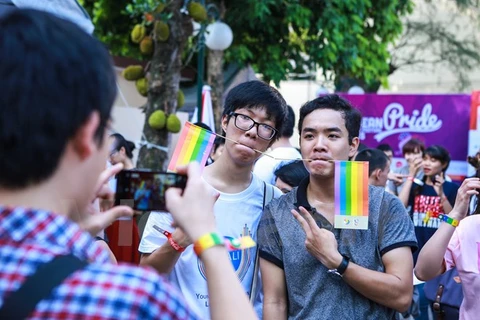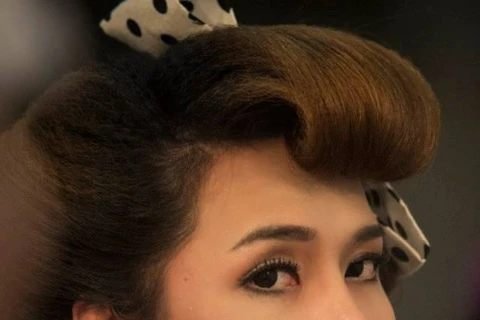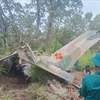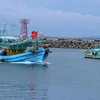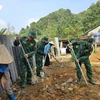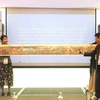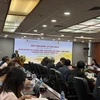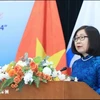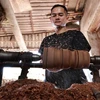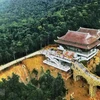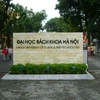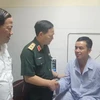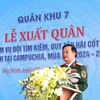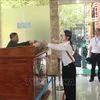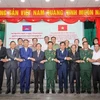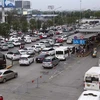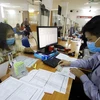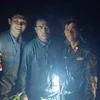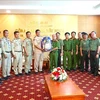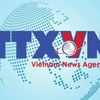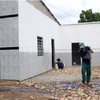Hanoi (VNA) – The rainbow colours, a widely-recognized symbol of LGBT people, have become popular among Vietnamese and it is not uncommon to see rainbow flags pinned to shirts and on car bumpers in the country.
It showed a tolerant attitude towards the once extremely sensitive issue in Vietnam -- sexual orientation as years ago, LGBT people wishing to come out always faced prejudice and discrimination from the public and even from their families.
Rainbow, not only in sky
Civil organizations have played a diverse role in the LGBT movement in Vietnam, helping it achieve remarkable advances in social acceptance.
The Institute for Studies of Society, Economy and Environment (iSEE) is among the pioneers.
“Toi dong y” (I agree) campaign was the first large-scale event mobilising rights for LGBT people in Vietnam,” Director of the Institute for Studies of Society, Economy and Environment (iSEE) Luong Minh Ngoc told Vietnam News Agency.
“Over 76,000 activists of all levels joined in the event in 2012 and 2013 to change the public mindset on the LGBT group.”
“Today, LGBT people feel more accepted than a decade ago when stigma and discrimination against LGBT individuals were popular,” she said.
iSEE’s “Toi dong y” made significant contributions to seeking the recognition of same-sex marriage in the Vietnam Marriage and Family Law in 2015 and created positive discussions about the LGBT people in the country.
 "Toi dong y" campaign made significant contributions to seeking the recognition of same-sex marriage.
"Toi dong y" campaign made significant contributions to seeking the recognition of same-sex marriage.(Photo: VNA)
Also, VietPride has led the way.
Inspired by the international Pride movement which advocates for the acceptance of LGBT persons, VietPride was created in 2012 to join global calls to end prejudice, discrimination and shame on the grounds of sexual orientation or gender identity.
During five years of operation, VietPride has worked hard to change the lives of Vietnamese LGBT people.
Rainbow-hued bicycles were one of the first public displays hosted by VietPride to depict the growing movement in Vietnam.
In 2012, hundreds of young people wearing rainbow flags gathered at My Dinh National Stadium in Hanoi for a bike parade as part of three-day long event held for homosexual people’s rights.
 VietPride was created in 2012 to join global calls to end discrimination on the grounds of sexual orientation or gender identity. (Photo: VietPride)
VietPride was created in 2012 to join global calls to end discrimination on the grounds of sexual orientation or gender identity. (Photo: VietPride) The VietPride events the following years were held in larger scale with rainbow colours worn by LGBT people and their peers in many cities and provinces across the country, including Hai Phong, Thanh Hoa, Da Nang, Quy Nhon, Nha Trang, Vung Tau, Ho Chi Minh City and Can Tho. The event was even aired by Vietnam Television channels like VTV4, VTV6 and VTV9.
Many activities were featured during the event, including film screenings, discussions on various LGBT issues, exchanges with the Parents, Families and Friends of Lesbians and Gays (PFLAG), music performances, speed dating and a LGBT history exhibition.
The VietPride Hanoi Committee, which comprised of many organisations and individuals working for LGBT rights in Hanoi, including 6+ , Hanoi Queer, NextGEN, CSAGA and iSEE, is supported by several embassies and international NGOs in the country.
Rainbow sparkles
The Embassy of Canada in Vietnam has helped support one of the largest LGBT festivities in Vietnam, VietPride 2015.
“We have been advancing the human rights of LGBTI persons by engaging with grassroots LGBTI organizations in Vietnam through the Canada Fund for Local Initiatives,” Ambassador of Canada Ping Kitnikone told Vietnam News Agency.
Earlier, the Embassy of Canada backed the screening of Canadian film director Deepa Mehta’s “Fire” in recognition of the second annual VietPride day celebrations. The film also contributed to the discussion on same-sex marriage and LGBT rights in Vietnam.
The Embassy once announced a grant of 94,252 Canadian Dollar through the Canada Fund for Local Initiatives 2014-2015 for three local NGOs: ICS Centre in Ho Chi Minh City, the Centre for Development and Integration (CDI) and the Center for Creative Initiatives in Health and Population (CCIHP) in Hanoi. The grants were used support projects on LGBT rights and anti-human trafficking interventions.
Recently, the Canada Fund for Local Initiatives also directly funded a project through LIFE Centre based in Ho Chi Minh City.
“This project worked toward building self-esteem and advancement of the rights of transgender individuals in health care, and promoted a more inclusive, gender sensitive and non-stigmatizing health service provision,” Ambassador of Canada Ping Kitnikone said.
In addition, the US Embassy, in collaboration with the Australian Embassy, the Embassy of the Netherlands, European Commission (EC) and Oxfam International, sponsored the BUBU town event in 2017. The annual event aims to celebrate the International Day Against Homophobia, Transphobia and Biphobia on May 17.
Ted Osius, the U.S. ambassador to Vietnam at the time, put the embassy’s support behind the event to spur a positive shift in the perception of the LGBT community in the country. The former ambassador also led 1,000 young Vietnamese on a city-round bicycle tour meant to show support for the LGBT in the nation.
The US Consulate in HCM City also issued the first fiancé visa to a same-sex couple in Vietnam.
Rainbow, also in people’s hearts
Despite difficulties accepting their children’s sexual orientation, many parents of LGBT people ended up supporting them and becoming activists to promote LGBT rights.
Dinh Thi Yen Ly, a mother from Ho Chi Minh City, was distraught when she learned her son, Teddy Nguyen, was gay.
Ly demanded Teddy to change his lifestyle and even took him to a psychology consultancy centre for treatment.
She then received a heart-wrenching letter from her son, in which he apologized to his mom and begged her to accept him. The letter made Ly realise that how hard her son was struggling with his sexual orientation.
It took Ly five years to get closer to her Teddy Nguyen and find out more about his son’s feelings.
She then took interest in LGBT rights and joined the Parents, Families and Friends of Lesbians and Gays (PFLAG) Vietnam, an organisation aiming to unite people who are lesbian, gay, bisexual and transgender with their families and friends, in 2013.
Two years later, Ly became the President of the PFLAG Vietnam. Its inception was nurtured by the Information Connecting and Sharing (ICS) project and it was officially established in 2011.
It works to speed up the growth of the parent community and provide a strong impetus for LGBT members to win their rights.
In 2014, PFLAG Vietnam launched “Hanh trinh hieu ve nhau” (Journey to understand each other), aiming to connect LGBT people and their parents and the event has been held in 20 provinces and cities nationwide.
 Dinh Thi Yen Ly (third from left) became the President of the PFLAG Vietnam in 2015.
Dinh Thi Yen Ly (third from left) became the President of the PFLAG Vietnam in 2015.(Photo: Cộng đồng PFLAG.vn)
Unlike Ly, Pham Thi Minh Hoa (from Thai Nguyen province) was slightly more accepting of her daughter.
“I’m not happy when my child is a transgender but I feel lucky when my child realizes her true sexual orientation,” she said.
“Mom Hoa” is a popular name in the LGBT community in Thai Nguyen province. Along with turning her house as a ‘headquarters’ for LGBT people, Hoa is also an activist for LGBT rights in Vietnam as a member of the PFLAG Vietnam.
Ly, Hoa and other parents in the PFLAG Vietnam have been working to promote their children’s fight for equal rights.
They have overcome social prejudice and inspired others of the LGBT movement in the country to protect their children. They have joined training courses on human rights and child protection and psychology consultancies.
Everyone wants to see beautiful rainbow, so do LGBT
“For sure, I will have meaningful activities for the LGBT community after returning to Vietnam with this victory,” Nguyen Huong Giang told the media after becoming new Miss International Queen 2018 at a contest on March 9 in Pattaya, Thailand.
Giang came to Thailand for sex reassignment surgery seven years ago. She said she felt lucky when her parents then accepted and welcomed her sexual orientation.
In the Q&A part of the contest, when asked what social campaign she would launch to make the world a better place, the Vietnamese singer answered: “I will work for equality for transgender people. Everyone wants to be happy and so do transgender people. We all want a good life where we are treated like everyone else and not discriminated against.”
According to PhD Nguyen Huy Quang, Head of the Legal Department under the Ministry of Health, Giang’s victory has shown that LGBT people must be recognised by the whole of society and it will serve to drive this recognition of transgender people in the country.
Efforts made by LGBT people and their supporters over the years have created a substantial change in the public awareness of the community.
Also, they have worked hard for the acceptance of same-sex marriage in legal documents, and the approval of the amended Civil Code in 2015, which includes a new provision of recognition of the right to sex reassignment.
“Please think of the child’s happiness as parents are only happy when their child feels contented with life,” Huong Giang said.-VNA
Previous: [LGBT community in Vietnam’s path to recognition]
Next:Vietnam and LGBT rights: Making strides
VNA


